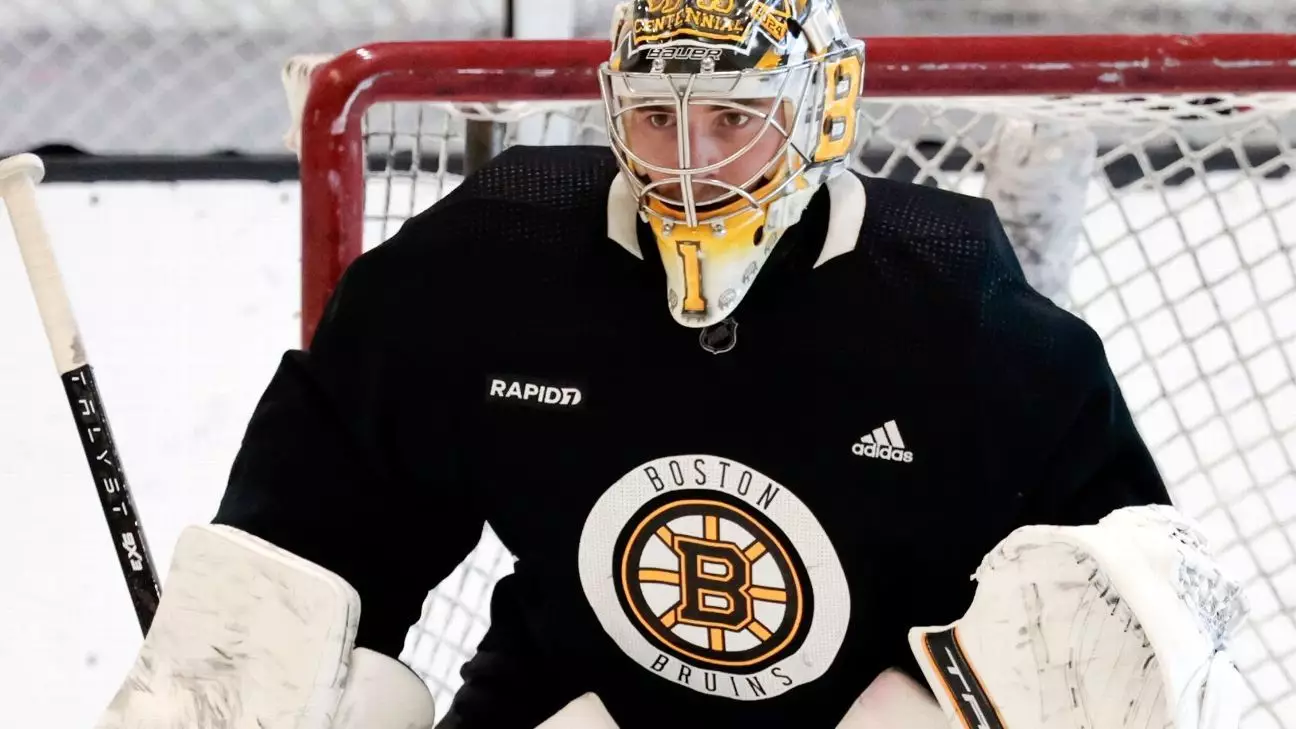The ongoing contract negotiations between the Boston Bruins and their restricted free agent goaltender, Jeremy Swayman, are starting to resemble a tense standoff more than amicable dealings typical of the NHL. With training camp underway, and significant games on the horizon, the absence of Swayman—a player expected to be a cornerstone of the Bruins’ future—has left fans and analysts alike wondering about the implications of his refusal to sign a new contract.
Trapped in the Crossfire
Swayman, who is 25 years old, has not reported to training camp this season as he and the organization grapple with contract expectations that have spiraled into public debate. Coach Jim Montgomery hinted that, in Swayman’s absence, Joonas Korpisalo is poised to take the reins as the starting goaltender for the Bruins’ season opener against the Florida Panthers. This decision not only indicates a shift in player availability but also underscores the importance of Swayman’s role within the team dynamic.
The Bruins, represented by team president Cam Neely, expressed confidence that Swayman’s desire to remain with Boston is genuine, though Neely deemed the lack of a finalized deal as “unfortunate.” This raises questions: Is a strong desire enough to bridge the gap between the player’s expectations and the organization’s budgetary constraints? Neely’s comments about having “64 million reasons” to play reflect the financial undercurrents affecting this negotiation—an indication that while salary negotiations are typically private, they can easily spill over into the public arena.
In a departure from the usual discretion exercised by agents, Swayman’s representative, Lewis Gross, publicly contested the figures disclosed by the Bruins, specifically the reference to a $64 million contract. Gross emphasized that this figure was unprecedented in their negotiations and that such assertions were detrimental to Swayman’s reputation. His statement illuminates a growing concern among agents regarding the transparency of contract talks when it comes to citing numbers that may not represent the true status of negotiations.
This moment in the public spotlight raises essential questions about the motives behind the disclosure of contract figures. Is this simply strategy, an attempt to manipulate market perception, or does it signal deeper issues within the organization regarding trust and respect? The dialogue surrounding the asking price has cast a shadow over Swayman’s status, wherein Neely suspected that the young goaltender wanted to “reset the goalie market.” However, the assertive response from Gross indicates a significant misalignment between player expectations and organizational standards.
The situation is amplified by the recent trade of Linus Ullmark, who was pivotal alongside Swayman in creating the NHL’s top goaltending duo over the past three seasons. The decision to part ways with Ullmark was driven by financial constraints and player demands—both of which have collided with Swayman’s need for a new contract. General Manager Don Sweeney’s approach has drawn criticism, particularly his choice to move Ullmark before securing Swayman’s future with the team.
Sweeney has defended his actions, articulating that the trade and Swayman’s contract negotiations were not intrinsically linked. This bold assertion raises legitimacy and accountability questions regarding strategic decisions impacting the team’s roster and, by extension, its ability to perform competitively. Sweeney’s faith in Swayman’s potential certainly seems peppered with risk given the current contract situation, as uncertainty looms large over the Bruins’ goalkeeping landscape.
Entering his fifth season in the NHL, Swayman has demonstrated vast potential with a record of 79 wins, matched with a commendable save percentage of .919. The crux of the debate, however, rests not merely on his past achievements but on what he is worth moving forward. With contracts reportedly in the realm of eight years and a figure potentially exceeding $9.5 million in average annual value, the stakes of these negotiations could place Swayman among the league’s highest-paid goalies—a testament to his evolving status.
As the countdown to a critical December 1 deadline looms, there is hope that this contract impasse will resolve favorably for Swayman and the Bruins. However, without swift negotiations, the greater question remains whether both parties can come to the table with a shared understanding of value, or if this conflict will continue to evolve, leaving one of the Bruins’ key assets languishing without a contract while the season opens. Every passing day brings heightened anticipation, proving that the stakes are higher than just money; they involve trust, legacy, and the future trajectory of the Bruins as a championship contender.


Leave a Reply